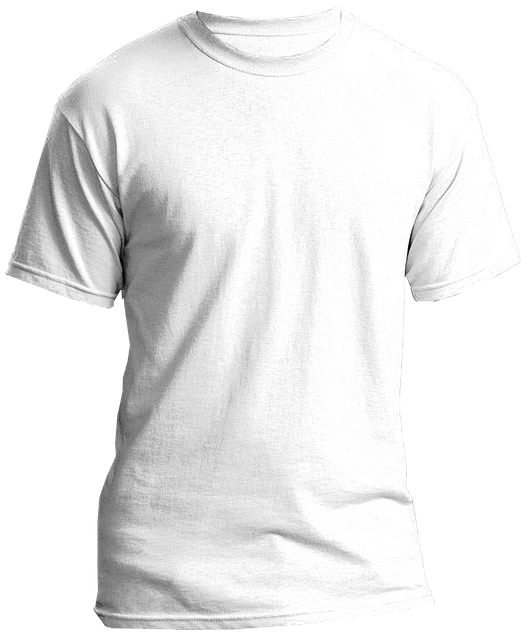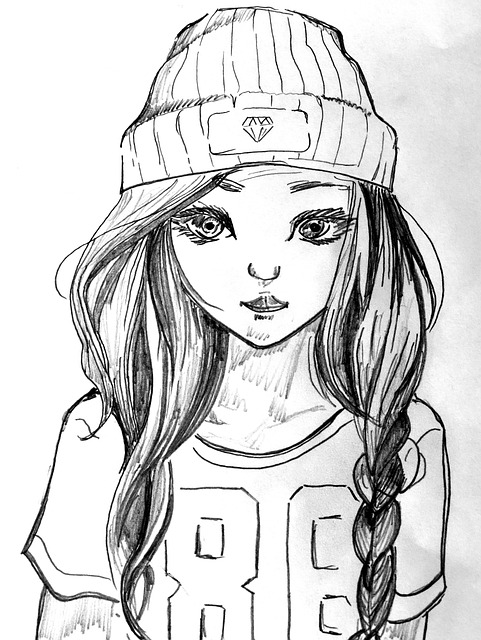T-Shirts Redefined: Sustainability, Art, Tech, and Cultural Commentary
The T-shirt industry is shifting towards sustainability with the introduction of eco-friendly materi…….

The T-shirt industry is shifting towards sustainability with the introduction of eco-friendly materials like organic cotton, recycled fabrics, and biodegradable synthetics such as modal and lyocell. This transition has significantly reduced environmental impact by cutting down on carbon emissions, water usage, and chemical dependency in production. Fashion brands are responding to consumer demand for ethical products, leading a move towards responsible consumption within fashion. Meanwhile, artistic collaborations have transformed T-shirts into canvases for creative expression, allowing them to serve as wearable art that represents individual style and cultural identity. The integration of technology has further evolved the T-shirt into smart clothing capable of health monitoring, contactless payments, and augmented reality designs. Additionally, t-shirts have become a powerful means of social commentary and activism, expressing views and advocating for causes through their imagery and messages. As such, T-shirts now stand at the intersection of fashion, art, and technology, reflecting broader societal issues and facilitating personal expression in contemporary culture.
Explore the evolution of casual fashion as we delve into the transformative wave of T-shirts that are redefining the landscape of everyday wear. From sustainable fibers reshaping the T-shirt industry to artistic collaborations elevating casual attire, this article unravels how innovation and creativity are stitching together a new era in fashion. We’ll also examine how technology integration is propelling the future of T-shirts and how these garments have become potent tools for social commentary, reflecting cultural shifts and sparking conversations worldwide. Join us as we explore this tapestry of change woven into the fabric of modern casual fashion.
- Sustainable Fibers Transforming T-Shirt Industry
- Artistic Collaborations Elevating Casual Wear
- Technology Integration: The Future of T-Shirts
- Cultural Impact: T-Shirts as Social Commentary Tools
Sustainable Fibers Transforming T-Shirt Industry

The T-shirt, a staple in casual fashion, is undergoing a significant transformation with the advent of sustainable fibers. Traditionally, the apparel industry has been criticized for its environmental impact, largely due to the reliance on non-renewable resources and pollutive manufacturing processes. However, innovations in fabric technology have paved the way for eco-friendly alternatives that are reshaping the T-shirt landscape. These sustainable fibers, derived from organic cotton, recycled materials, or biodegradable synthetics like modal and lyocell, offer a more environmentally conscious choice without compromising on comfort or style. The use of these fibers not only reduces the carbon footprint but also minimizes water consumption and chemical usage during production. Companies are increasingly adopting these practices, recognizing that sustainability is not just an environmental imperative but a growing consumer demand. As a result, the T-shirt industry is evolving, with a burgeoning selection of sustainable options that cater to both ethical shoppers and the planet’s well-being. This shift underscores a broader movement towards responsible consumption in the fashion sector, signaling a positive change in how garments are produced and perceived.
Artistic Collaborations Elevating Casual Wear

Artistic collaborations have long been a cornerstone in elevating casual wear beyond its humble beginnings. T-shirts, traditionally associated with informality and comfort, have found new life through partnerships with artists, designers, and creators who bring their unique visions to the canvas of cotton. These creative alliances transform simple garments into wearable art pieces, each telling a story or conveying a message that resonates with those who don them. The fusion of artistic expression with functional fashion has led to an explosion of creativity in the casual wear market, where each T-shirt becomes a statement about its wearer’s identity and values. These collaborations not only push the boundaries of design but also challenge consumers to think beyond the conventional, embracing apparel that combines aesthetic innovation with everyday comfort. As a result, T-shirts have evolved into versatile symbols of both personal style and cultural commentary, offering a platform for artists to reach wider audiences and for brands to differentiate themselves in a saturated market. The synergy between the creative community and the fashion industry has thus redefined casual fashion, making T-shirts not just an item of clothing but a medium for artistic expression.
Technology Integration: The Future of T-Shirts

In recent years, the humble T-shirt has undergone a transformation, with technology integration playing a pivotal role in redefining its place within casual fashion. Smart textiles, once confined to athletic wear, are now finding their way into everyday T-shirts. These fabrics are infused with sensors and conductive fibers that can monitor vital signs or interact with digital devices seamlessly. This integration not only enhances comfort but also opens up new functionalities, such as payment capabilities through contactless technology embedded within the shirt. Moreover, advancements in augmented reality (AR) are enabling designers to overlay digital patterns and images onto the T-shirt, offering a dynamic visual experience that changes with context or lighting conditions. As these technologies become more accessible and cost-effective, we can anticipate T-shirts becoming even more sophisticated, blurring the lines between fashion and technology.
Looking ahead, the future of T-shirts is poised to be at the intersection of style and innovation. We are on the cusp of wearable technology that is less conspicuous and more integrated into our daily attire. This will include everything from biometric tracking to environmental sensors that react to pollutants or allergens, providing the wearer with real-time feedback. The potential for personalization is also vast, with T-shirts that can display messages or images on demand, or adapt to different weather conditions with phase-change materials. As these technologies continue to evolve, the T-shirt stands to become an even more versatile garment, not just a staple in our closets but a companion that enhances our everyday lives.
Cultural Impact: T-Shirts as Social Commentary Tools

T-shirts have transcended their status from a simple garment to become potent social commentary tools, reflecting and influencing cultural norms and societal discussions. They serve as a canvas for self-expression, where individuals can convey messages, support causes, or challenge the status quo through the power of visual imagery and text. Historically, t-shirts have been used to make powerful statements, from protest movements to grassroots campaigns, showcasing their capacity to capture the essence of a moment in time or a prevailing sentiment within society. The cultural impact of t-shirts as social commentary is evident in their ability to initiate conversations, spark debate, and even provoke change. They can encapsulate complex ideas into a wearable form that reaches diverse audiences, transcending barriers and entering public discourse.
In contemporary times, the proliferation of digital printing technology has democratized the design and production of t-shirts, allowing for an unprecedented variety of messages to be disseminated. This has led to a new era where t-shirts are not just fashion items but also powerful instruments for communication and cultural commentary. They can convey solidarity with social movements, highlight critical issues, or even serve as a form of satire. The t-shirt’s accessibility and versatility make it an influential medium in the realm of visual activism, capable of resonating across different cultures and communities, thereby redefining what it means to be casual fashion in the context of social commentary.
In conclusion, the evolution of T-shirts has transcended their status as mere casual attire, becoming a canvas for sustainability, artistry, and technological innovation. As we integrate eco-friendly fibers, witness artistic collaborations that elevate everyday wear, and embrace cutting-edge technology to redefine the future of this ubiquitous garment, T-shirts have emerged as powerful social commentary tools. The industry’s continuous transformation underscores a shift towards more responsible and expressive fashion choices, signaling a new era for how we perceive casual clothing.





